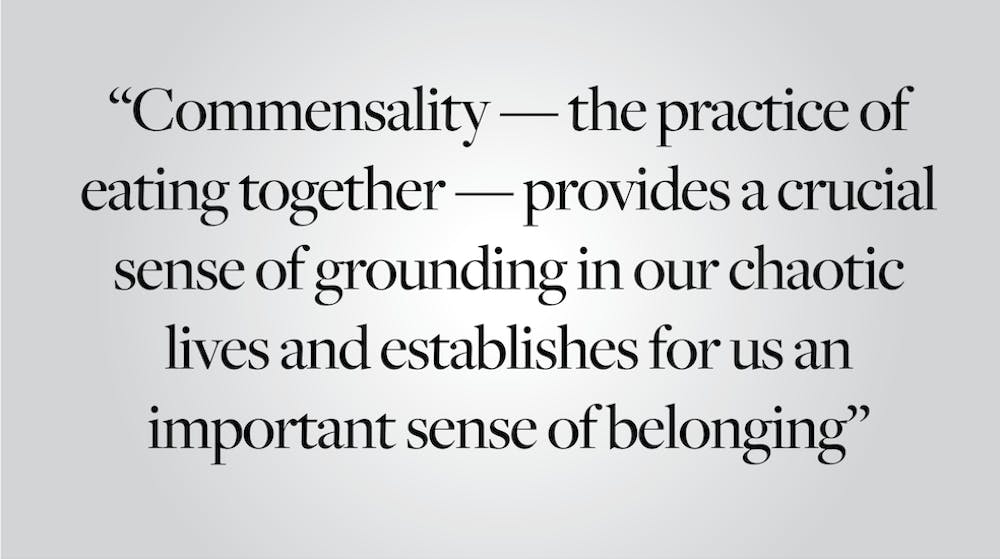During my first few weeks at Brown, I didn’t feel like any particular experience was missing from campus life. That’s until Steak Sunday started. It’s the perfect end-of-week ritual — and the one I’ve come to believe that no college experience is complete without. After seeing how cheap grills are at Walmart, one of my friends proposed a grill night. As the steaks began sizzling, more and more students gathered in Keeney Quad and it became clear that a tradition was being born. One coal grill, a couple of steaks from Whole Foods, prep in Arnold lounge and students congregating in Keeney Quad to enjoy it all — Steak Sunday is elegant in its simplicity. But it represents something much more than just a social activity that finishes off our week.
I believe in food as an anthropological constant — despite how crazy the world gets, I can always rely on it to be a consistent part of my reality. This is not a new idea. In fact, the anthropology of food is a well-documented field that Brown even offered a class about this semester (ANTH 0680, for all who are interested). While I didn’t get to take the class, I do believe that commensality — the practice of eating together — provides a crucial sense of grounding in our chaotic lives and establishes an important sense of belonging.
Our primary source of commensality comes from family meals, but today the family meal is in decline. While family meals teach commensality and may entice individuals to seek out shared meals after leaving the home, they also perpetuate household inequalities and somewhat depend on socioeconomic status. Commensality is also increasingly threatened by an age of hyper-individualization, where phones and the internet have stunted face-to-face interactions and encouraged the practice of eating alone. Watching television, YouTube or scrolling on social media not only provide sources of individual engagement during a meal, but they discourage others from joining and sharing a meal with those eating solo. But while commensality faces a host of challenges, they shouldn’t cause us to give up on the shared meal as a whole. It is never too late to focus on and develop commensality even after you leave home.
Despite the obstacles to regular commensality in the modern age, I find value in the shared meal for so many reasons. It is a practice built into all of our lives that we can engage in despite our apparent differences. Eating together diffuses tension and provides a basis for building community that comes naturally to all. It is a common denominator built into society. Furthermore, cooking, as a core part of commensality, is a deeply ritualistic practice that provides comfort and a sense of home. Cooking and eating form a language of their own, allowing profound connection that transcends other divides.
And even though digitalization may be responsible for discouraging the traditional shared meal, the internet has given birth to a fascinating world of digital commensality. Sharing pictures of food on social media, watching cooking or food review videos on YouTube and engaging in online communities dedicated to different cuisines are all ways we use the internet to practice our cooking and eating rituals alongside one another. Digital commensality exists outside of the home meal, but still serves the same purpose, proving that shared meals are not an antiquated ideal that we will grow out of. The way we find ourselves sharing food with others online indicates an innate attraction to commensality and its relevance in our evolving society.
When discussing commensality, politics is often brought up. People frequently point out the shared meal’s responsibility to foster productive discourse. In our ever-polarized society, shared meals remind us of our basic humanity amid divided times. But I don’t think you necessarily need to use commensality to talk politics. Food can exist as a sacred resource of familiarity and comfort. While commensality can sometimes serve as a bastion of political conversation, that’s not always the point and you shouldn’t feel obligated to make it so. Commensality has inherent value beyond anyone’s political motivations.
Through this lens, Steak Sunday takes on a whole new — yet relatively simple — meaning. Steak Sunday gives Keeney Quad an extremely human practice that isn’t necessarily promoting any ground breaking discussions. Steak Sunday represents our collective will to share a meal, to come together and engage in a sense of ritual. It revels in this simplicity because it has no greater purpose.
Paul Hudes ’27 can be reached at paul_hudes@brown.edu. Please send responses to this opinion to letters@browndailyherald.com and other op-eds to opinions@browndailyherald.com.
Paul Hudes is a staff columnist and a member of the editorial page board for the Brown Daily Herald. His column is wide-ranging but focuses mostly on American politics. Paul studies Applied Math Economics and English Literature.





